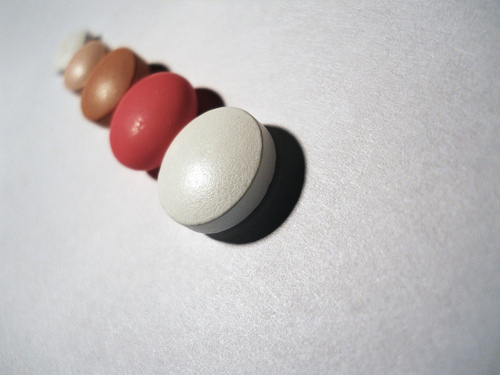I’m not a doctor, nor do I play one on TV, but I did stay at a Holiday Inn Express last night . . . I also took a Colgate University class on medicating for mental health and judicious use of psychiatric drugs.

- A psychiatric medication is only one useful tool among a collection of useful tools. Remember to also consider non-drug options for therapy.
- The benefits of psychiatric medications are always accompanied by risk. Become familiar with the potential risk of your medication. Be alert to potential risks that might be intolerable to you.
- Establishing a diagnosis is a difficult and imperfect task, but it establishes the starting point for determining which treatments are appropriate.
- Engage your physician or a psychologist in a dialogue regarding the structure of your treatment program. Be an active participant in establishing the structure of that program. Having confidence that your treatment program will work is important for its success.
- Become familiar with the vocabulary of psychopharmacology and with some basic principles of psychopharmacology. It will improve your ability to communicate with your physician or therapist.
- Be forthcoming and candid with your physician or therapist when working to establish realistic goals for your use of psychiatric medication. These goals should include the meaningful improvement of symptoms and side effects that are acceptable to you.
- A treatment program should aim to not only produce meaningful improvement of symptoms but also should include a plan to prevent relapse.
- A psychiatric medication is limited in its effectiveness for improving a problem that has biological, psychological, and social characteristics.
- Ask whether the use of your recommended psychiatric medication is supported by published evidence or is an off-label prescription based upon educated guesswork. If your prescribing physician doesn’t know the answer to that question tell him or her to find out for you.
- Remind yourself that a psychiatric medication will alter the neurochemistry of your brain and that the effects of medication on the brain can persist and may be permanent.
- The ideal dosage of a psychiatric medication is the smallest dosage that is able to provide meaningful relief of symptoms.
- Fulfill your responsibilities for ensuring the success of your treatment program. Be fully cooperative regarding instructions for using medication and for taking the advice of the therapist.
- Remember that counseling, psychotherapy, or behavioral therapy may enhance the effectiveness of a psychiatric medication.
- Remember also that a psychiatric medication may enable counseling, psychotherapy, or behavioral therapy to be more effective.
- Newer psychiatric medications are often more expensive medications despite the fact that those newer drugs may not be more effective than older medications.
- Newer psychiatric medications have been used for a shorter period of time and by fewer people than older medications. This fact increases the likelihood that newer medications might bring unpleasant surprises.
- Herbal remedies and dietary supplements may or may not be effective or safe and very few of those remedies have been studied in well-designed experiments to evaluate their effectiveness and their relative safety.
- If possible, avoid using multiple medications in order to minimize the possibility of harmful drug interactions.
- Direct-to-consumer advertising of psychiatric medication is principally intended to get you to buy a product. That product may or may not be in the best interest of your own physiological, emotional and psychological well-being.
- Be aware that your health insurance provider may structure costs to you, the patient, in a way that provides some incentive to use one drug instead of some other drug or to use medication instead of psychotherapy. If possible, try to make the principal goal of your therapy to be the relief of symptoms, not the lowest cost of treatment.
- The elderly present special vulnerabilities for psychiatric medications — for example, enhanced sensitivity, likelihood of polypharmacy, or increased risk of falling.
- Exposing the young, still-developing brain of a child or adolescent to a potent psychiatric medication risks creating problems for those brains when they reach adulthood.
- The recent trend is to rely more upon psychiatric medication than upon non-drug therapies to treat psychopathology. Resist that trend when you are not convinced that medication is the best choice for you or for a member of your family.
- The study of brain and behavior is a frontier science. Thus the use of drugs that alter brain neurochemistry to treat psychopathology is based upon an incomplete understanding of brain and behavior.
- Because our current understanding of brain and behavior is incomplete, contemporary psychiatric medications are imperfect tools that are clinically useful until we learn enough to develop better tools.

1 comment for “25 Concepts to Facilitate Judicious Use of Psychiatric Drugs”